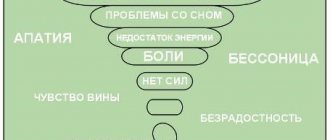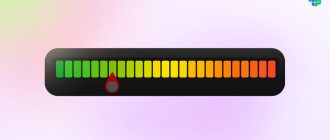They say that all the most beautiful and sad works of art were created in the fall and it’s all to blame for depression, which at this time covers quite a large part of the world’s population. What is autumn depression? Does such a diagnosis exist in medicine, or did people who like to mope come up with it themselves in order to somehow justify their tendency to pessimism?
What is autumn depression
A beautiful autumn day, amazing weather, sunny and still warm. People are taking advantage of the last warm days to enjoy the sun before the long winter. It would seem that everything is great, but nevertheless, something is wrong - your good mood has disappeared somewhere, and unreasonable irritability has appeared in its place. If such feelings are familiar to you, then it is likely that you have autumn depression.
Content:
- What is autumn depression
- What Causes Autumn Depression
- How to recognize seasonal blues
- Should autumn depression be treated?
- Diet against autumn sadness
- Foods that increase autumn depression
- How to prevent blues
People say different things about autumn depression. You can often hear that such a disorder does not exist and all mood swings have nothing to do with the change of seasons. Others mistakenly believe that depression is simply sadness or a personality trait. Meanwhile, experts have a slightly different opinion on this matter.
The term “autumn depression” is relatively new. It was invented in 2005 by therapist Gene Scully. In the literature you can find other names for this condition - seasonal affective disorder or seasonal affective syndrome. This condition is characterized by a number of psychosomatic disorders that occur in people as autumn approaches and usually persist until the first months of winter. Depression may have a social, psychological or biological origin. In addition, there is a so-called summer type of seasonal depression. It is not as common as autumn. This disorder begins in late spring and early summer and ends in the fall.
It is estimated that approximately 4-5% of the total population of the planet suffers from autumn depression, and in 10-20% of them the disorder is not accompanied by pronounced symptoms. Autumn depression is more common in women than in men. The peak manifestation of the disorder is at the age of 40-55 years. Autumn blues also happen in children. There is evidence that approximately 1.7% of children over 9 years of age also suffer from seasonal affective disorder.
Autumn depression cannot be underestimated. This is one of the most common causes of alcoholism and suicide. Statistics indicate that every two out of three suicides suffered from depression. It is also interesting that the autumn blues last longer and are more severe among residents of northern countries, that is, regions with less sunlight. And it extremely rarely affects residents of countries where the weather remains sunny all year round.
Some believe that autumn depression is the result of a lack of willpower. However, in 2007, American experts conducted an experiment with the participation of people suffering from depression. It turned out that the more the subjects tried to suppress their blues and anxiety, the more the so-called “fear center” was activated in their brains. This allowed experts to conclude that willpower has nothing to do with depression. And it’s hard to blame Abraham Lincoln or Winston Churchill for lack of willpower, but they, nevertheless, constantly suffered from the seasonal blues.
Another common misconception about depression is that it is not a real illness. Yes, blues cannot be diagnosed by a blood test, like diabetes, for example. However, this is a real disease that requires professional treatment. Therefore, depression and sad mood should not be confused. Sadness is fleeting and temporary, it appears regardless of the time of year and always has a specific reason. Seasonal depression appears regularly at the same time (in the fall) and for seemingly no apparent reason.
Why do some people experience depression or worsen it in the fall?
Autumn depression is a special psycho-emotional state, characterized by a depressed state and a predominance of negativism.
With the onset of autumn, the mental state becomes less stable, which is why psychological problems begin to worsen. This is true not only for depressive disorders, but also for schizophrenia and other psychopathologies.
Why does depression begin in the fall? Psychologists give the answer: the causes of depressive disorder are the end of summer; the onset of damp, cloudy weather weakens the protective functions of the immune system, worsens mood, and provokes changes in a person’s psycho-emotional sphere for the worse. The cause of exacerbation is hereditary factors that increase the impact on a person’s weak mental state.
Autumn depression has an official name - seasonal affective disorder
What Causes Autumn Depression
It is difficult to answer with certainty what causes autumn depression. Different researchers put forward different theories, many of which have a rational grain. One of the most common theories explains the seasonal blues due to hormonal changes. But there are other assumptions.
Increase melatonin
As daylight hours shorten, the concentration of the hormone melatonin increases in the human body. The more of this substance in our bodies, the stronger and more often we want to sleep and the less interest our usual life causes.
In addition, excess melatonin leads to a decrease in body temperature, which activates another response - consuming more high-calorie foods, which serve as a source of energy.
These seasonal changes in the body explain why, for some people, fall and winter are all about sleeping and eating. The result of this lifestyle is rapid weight gain, which makes depression even worse.
Decreased serotonin levels
As for hormonal levels, in this regard, everything in the human body is interconnected. As a rule, an increase in the concentration of one hormone causes a decrease in another. This happens with the “duet” melatonin-serotonin. The higher the melatonin content, the less serotonin in our blood. The latter is also known as the hormone of good mood or happiness. A lack of this hormone is a direct path to deep depression.
Decreased dopamine
Dopamine is another hormone whose amount in our bodies directly depends on the intensity of sunlight. The shorter the day, the less dopamine we have and the more prone we are to blues. Dopamine is responsible for concentration and attention. When the body lacks a hormone, a person loses interest in many previously loved things, including life in general.
Vitamin D deficiency
Decreasing sunshine is one of the biggest reasons why people suffer from anxiety and depression in the fall or winter. At this time, the days become shorter, most of us spend less time outside, our skin is less exposed to the sun, which causes a deficiency of vitamin D. And according to the results of many studies, a lack of this vitamin leads to depression and irritability. Fortunately, during the fall and winter, vitamin D can be taken with food or in the form of pharmacy vitamins. So everyone can cope with this cause of autumn depression.
Seasonal allergies
A 2009 study showed that when a person is sick, their mental state also changes: they feel depressed and become prone to blues. In another experiment, experts found confirmation of the existence of a relationship between allergies and depressive mood. Scientists suggest that the culprits are substances that are produced in the body during allergies and affect the immune system. As a result, against the background of seasonal allergies, immunity deteriorates, and with it, mood.
Scientists say that timely treatment of allergies can help get rid of depression.
Low physical activity
This factor, according to scientists, also contributes to the development of autumn depression. According to American experts studying the nature of the blues, daily 10-minute walks are enough to improve your emotional state and prevent the development of seasonal sadness.
Genetics
Experts are confident that a person’s tendency to fall into depression can also be determined by genetics. If parents or other relatives suffer from prolonged depression, this does not mean that the descendant will necessarily have this disorder. But the family factor still increases the risk of seasonal blues. Therefore, it is very important for people with a family history of depression to avoid drugs and alcohol, which can serve as triggers for the disorder.
Return to school/work
Do you think schoolchildren and students don’t experience autumn depression? It happens, and what! Even if a child enjoys studying, returning to school after the summer holidays is always stressful (for some it’s mild, for others it’s more intense). It is not easy for everyone to switch to a new mode of life, and if this time happened during a period of cold weather and rains, then it is often not easy for children to survive the “perestroika” “painlessly”. Hence the blues. Something similar happens to adults whose vacation (especially if it was long) occurred in the summer, and in September it is time to return to work.
Treatment options
There are many treatments for autumn depression. They can be combined, supplemented, or better yet, used comprehensively. Because the degree of depression and other features may vary, then the methods of combating ML may also differ . Everything depends on the person himself, on external conditions, on opportunities.
Compensation for lack of light
You need to try to spend more time in the fresh air. At least take a walk during your lunch break, if it’s already dark outside at the end of the working day. After all, even in gloomy autumn there are sunny days, and clouds do not hang 100% of the time throughout the entire period. At home (or in the office) you can install additional lighting to create at least the illusion of a sunny day. Women can visit the solarium.
Physical activity, sports
Regular physical exercise accelerates blood flow in the body and speeds up metabolism. Thanks to them, the body begins to produce more testosterone, endorphins, adrenaline, and insulin. They improve well-being, improve mood, and displace cortisol (stress hormone) from the body. You can start with at least morning exercises, evening jogging, push-ups, squats.
Change the scenery
You can try to take a vacation not in the summer, but in the fall. In September (and in some regions even in October) it is still quite warm, you can spend your leisure time almost the same as in summer. Perhaps with some restrictions, but there is a chance to bypass or mitigate the autumn blues. Or try to change your surroundings on the weekends. As an option, changing your job if you’ve been tired of it for a long time does not bring satisfaction. Looking for a job, adapting to a new place, a new team - all this will help take your mind off depression.
Review your diet
Change your diet. Include healthy foods, fruits, and vegetables. Be sure to include foods rich in vitamin B in your diet. It performs the function of balancing hormones in the body. Take multivitamins, they compensate for the lack of microelements the body needs.
Establish sleep/wake routine
You need to go to bed and wake up at the same time. Don't sit too long in front of the computer/TV. The duration of sleep should be at least 7-8 hours a day. Before going to bed, you need to ventilate the room well. 2 hours before bedtime, do not eat. And also do not engage in any activity before bed, so that it is not difficult to fall asleep. To get rid of the flow of thoughts, you can take sedatives made from natural ingredients.
Avoid loneliness
Although a person in a state of OD does not want to communicate with the outside world, it is a mistake to isolate himself from it. We need to communicate more. And for communication, choose positive, active, energetic, friendly people. If there are none, then try to make new acquaintances. For single people, this is a good reason to find your soulmate.
Pleasure yourself
A person can please himself by purchasing some nice little things. Whether it's a new computer game, jewelry, clothes, shoes. Do not deny yourself trips to the cinema, philharmonic, or club. If you are planning to make a significant or long-awaited purchase (car, furniture, apartment, cottage, telephone), then do it in the fall. Positive emotions from a purchase can distract or cover up worries, blues, and indifference.
Drug treatment
It is prescribed by a doctor. You cannot take medications on your own. Of course, such treatment is carried out only in advanced conditions. When the usual rhythm of life is difficult, there is no motivation, and the tried means have not helped. The doctor may prescribe a course of psychotherapy. Pharmacological treatment consists of taking serotonergic antidepressants, antipsychotics, and psychostimulants. But this is in extreme cases. Usually, after examination and diagnosis, autogenic training, psychological conversations, art therapy, and hypnosis are prescribed.
How to recognize seasonal blues
The disorder, depending on its severity, can manifest itself with different symptoms. But there is always something in common - signs by which one can suspect seasonal depression in a person. Here they are:
- unmotivated sadness;
- lack of interest in the things that make up daily life;
- reluctance to do anything;
- insomnia or, conversely, the desire to constantly sleep;
- impaired concentration;
- irritability, moodiness;
- the desire to protect oneself from other people;
- decreased sex drive;
- loss of appetite (either complete absence or desire to constantly eat);
- thoughts about suicide.
These signs may appear to a greater or lesser extent, in different combinations. But they are always a warning sign.
Symptoms of autumn blues
- Constantly low mood.
- Feelings of sadness, anxiety or guilt.
- Decreased interest in the outside world, loss of motivation at work.
- Apathy, indifference to surrounding people and phenomena.
- Feeling hopeless and losing the ability to experience joy.
You should be wary if at least three of the above symptoms are present and if the depressed state is especially pronounced in the first half of the day, and after 16 hours there is a noticeable improvement.
Should autumn depression be treated?
The answer to this question depends on the state of the person who succumbs to autumn sadness. Some people experience mild blues for a few days or weeks, but even during this time the disorder does not manifest itself with life-threatening symptoms. In such cases, we can talk about a “bad mood,” from which a person often recovers on his own or with the support of friends. But there are times when it seems impossible to pull a person out of depression without qualified help from specialists. If he is not provided with the help of a psychologist, psychotherapist or psychiatrist in time, you can be sure that the blues will not end when the weather improves, but will only get worse.
Treatment of seasonal depression can be based on different approaches and techniques: from the use of antidepressants to increase the level of serotonin in the body, to phototherapy and psychotherapy methods.
Depression in teenagers
Signs of depressive disorder in adolescents: isolation, predominance of negativism, emotional indifference. The teenager keeps the people around him at a distance. Parents are obliged to monitor the psycho-emotional state of the child, recognize in time, and begin to fight the depressive state.
Teenage depression is not a temporary laziness
Diet against autumn sadness
Autumn depression can be avoided if you slightly adjust your diet. In particular, to prevent or eliminate the blues, it is important to include in your diet foods that contain substances that will be discussed below. Their task is to restore serotonin levels and improve the relationship between nerve cells in the brain, which is also important for effectively combating autumn depression.
Vitamin C. This vitamin has proven to be very useful in treating depression, including bipolar depression. It reduces the amount of vanadium in the body, which has been recognized as one of the culprits of the blues. Sources of vitamin C: citrus fruits (lemons, grapefruits, oranges), pineapple, strawberries, papaya, onions, garlic, almonds, walnuts, cashews.
Vitamin B9. This substance is one of the most effective for increasing serotonin. The most useful are cashews, asparagus, oats, cabbage, peppers, oranges, carrots, lettuce, tomatoes, apples, pears, almonds, and potatoes.
Vitamin B12. It is important for the proper functioning of the central nervous system. Best sources: shellfish, chicken liver, red meat, milk.
Tryptophan. This amino acid is considered the best natural relaxant, and it also serves as the “raw material” for the production of serotonin. You can restore tryptophan reserves from chicken and turkey meat, citrus fruits, tomatoes, mangoes, figs, chestnuts, oatmeal, cabbage, cashews, onions, and pumpkin.
Phenylalanine. This amino acid promotes the production of norepinephrine, which in turn prevents depression. This component can be found in all protein foods.
Best materials of the month
- Coronaviruses: SARS-CoV-2 (COVID-19)
- Antibiotics for the prevention and treatment of COVID-19: how effective are they?
- The most common "office" diseases
- Does vodka kill coronavirus?
- How to stay alive on our roads?
Calcium. It, together with magnesium, potassium, selenium and lithium, can also serve as a good prevention of depressive disorders. It can be obtained from cabbage, chestnuts, walnuts, apples, mangoes, avocados, and almonds.
Omega-3. Referring to the results of various studies confirming the antidepressant properties of Omega-3, experts advise eating foods containing unsaturated fatty acids in the fall. First of all, we are talking about fatty sea fish and flaxseed oil.
Capsaicin. This substance is found in hot peppers (chili, cayenne). It has been proven that endorphins, known as “happiness hormones,” are more actively produced in the bodies of spicy food lovers. If there are enough of them in the body, there can be no talk of any depression.
Garlic. When talking about products against the autumn blues, it is impossible not to mention this vegetable separately. It contains almost all substances with antidepressant properties. Garlic is a source of vitamin C, magnesium, calcium, potassium, selenium, phenylalanine and tryptophan. In addition, it contains substances that have a beneficial effect on the entire nervous system: caffeic acid, apigenin, geraniol, linalool, stigmasterol.
Depression in men
Autumn depression in men has a serious impact on communication, work and personal life. Symptoms of depressive disorder in men are withdrawal and depression. It is more difficult for a man to share his problem with others. He tries to “veil” his life difficulties, afraid of looking weak, unable to cope with his problems.
The best way for a man to fight depression is to take a vacation, turn off the alarm clock and phone, get more rest and eat a balanced diet.
Foods that increase autumn depression
It is widely believed that dark chocolate helps fight bad mood. However, this does not mean that you can “treat” autumn depression with any sweets.
On the contrary, scientists have found evidence that simple sugars, by affecting processes in the brain, only increase depression. Also in the fall, you should be careful when consuming coffee and other caffeine-containing products, as they can aggravate the blues.
Alcohol and other stimulants are strictly prohibited for people prone to seasonal depression. These products have pronounced depressant properties. Many people mistakenly believe that alcohol helps improve their mood. In fact, and this is scientifically proven, any alcohol affects the human brain as a depressant.
How to avoid getting depressed in the fall
It is always better to take care of an impending problem in advance, rather than wait for several problems to turn into a big “snowball”.
Think now about how not to fall into autumn depression, how to avoid its symptoms. Psychologists voice mandatory rules on how to escape from autumn depressive disorder:
- Walks. Breathe fresh air. Saturation of blood with oxygen improves brain activity and calms the nervous system.
- Don't be afraid of life changes. Nature is cyclical. One season gives way to another.
- Treat your body with care. Try a massage or yoga. Relax your body, mind.
- Visit exhibitions, art galleries, cinema, theater. Enjoy life.
Psychologist's advice
To get rid of the autumn blues, you need to add bright colors to your life. You shouldn't dress in all dark. It’s worth adding cheerful colors to your outfits. If you don’t want to radically change your wardrobe, you should just add accessories in bright colors.
You should try to eat varied, trying all kinds of dishes and desserts. You need to rest as much as possible. Depression can occur immediately after waking up if you haven't gotten enough sleep. That’s why you need to make a smart schedule to devote more time to sleep.
It is important to smile at yourself in the mirror as often as possible. Laughter can restore emotional and physical well-being. That is why there should be at least 5 minutes of laughter a day. You can look at photos from your vacation, especially those in which you are smiling.
You should focus your attention exclusively on happy events. It is important to walk as much as possible as this will help restore lost energy.
Found a violation? Report content











